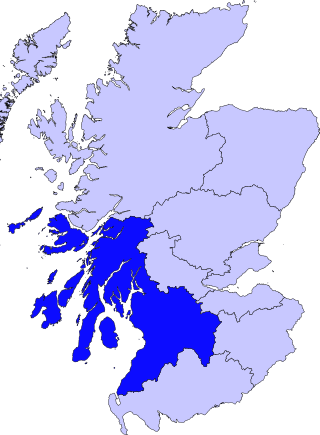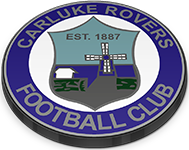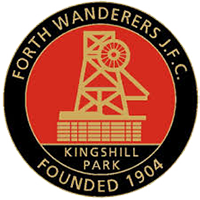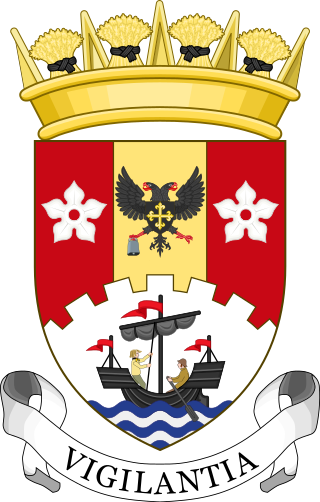Related Research Articles

Glasgow City Council is the local government authority for Glasgow City council area, Scotland. In its modern form it was created in 1996. Glasgow was formerly governed by a corporation, also known as the town council, from the granting of its first burgh charter in the 1170s until 1975. From 1975 until 1996 the city was governed by City of Glasgow District Council, a lower-tier authority within the Strathclyde region.

Lanark is a town in South Lanarkshire, Scotland, located 20 kilometres to the south-east of Hamilton. The town lies on the River Clyde, at its confluence with Mouse Water. In 2016, the town had a population of 9,050.

Dunbartonshire or the County of Dumbarton is a historic county, lieutenancy area and registration county in the west central Lowlands of Scotland lying to the north of the River Clyde. Dunbartonshire borders Perthshire to the north, Stirlingshire to the east, Lanarkshire and Renfrewshire to the south, and Argyllshire to the west.

Strathclyde was one of nine former local government regions of Scotland created in 1975 by the Local Government (Scotland) Act 1973 and abolished in 1996 by the Local Government etc. (Scotland) Act 1994. The Strathclyde region had 19 districts. The region was named after the early medieval Kingdom of Strathclyde centred on Govan, but covered a broader geographic area than its namesake.

Carluke Rovers Football Club are a Scottish football club based in Carluke, South Lanarkshire. Nicknamed The Rovers, they were formed in 1887, although documented evidence shows a club called Milton Rovers, Carluke's original name, were playing matches during 1886, and are based in the John Cumming Stadium. The club compete in the West of Scotland League Fourth Division. The team are managed by Thomas Devine along with Mark McRoberts (Coach), Peter Kane (Coach), Tony Boyce (Coach), Scott Mathieson (Coach) & Cieran Henderson

Forth Wanderers Football Club are a Scottish football club based in the village of Forth, South Lanarkshire. Formed in 1904 they compete in the West of Scotland League Second Division and play in red strips with a white trim with a second strip of all black.

Lesmahagow Junior Football Club is a Scottish football club based in the town of Lesmahagow, South Lanarkshire, located just off the M74 motorway approximately 25 miles south of Glasgow.

South Lanarkshire Council is the unitary authority serving the South Lanarkshire council area in Scotland. The council has its headquarters in Hamilton, has 16,000 employees, and an annual budget of almost £1bn. The large and varied geographical territory takes in rural and upland areas, market towns such as Lanark, Strathaven and Carluke, the urban burghs of Rutherglen, Cambuslang, and East Kilbride which was Scotland's first new town. The area was formed in 1996 from the areas of Clydesdale, Hamilton and East Kilbride districts, and some outer areas of Glasgow district ; all were previously within the Strathclyde region from 1975 but in historic Lanarkshire prior to that.

The Local Government (Scotland) Act 1889 is an act of the Parliament of the United Kingdom which was passed on 26 August 1889. The main effect of the act was to establish elected county councils in Scotland. In this it followed the pattern introduced in England and Wales by the Local Government Act 1888.

Linthouse Football Club was a football club from the Linthouse district of Govan, Scotland. The club played in navy blue.
Cambuslang Football Club was a Scottish football club, based in the Cambuslang area. Cambuslang was one of the founding members of the Scottish Football League, but left the league after just two seasons.
Thistle Football Club was a 19th-century football club based in Glasgow. The club was briefly a member of the Scottish Football League Division Two, and has been described as the most insignificant and least successful to have entered the league. It played at Braehead Park during its Scottish League season.

Charles Wallace Alexander Napier Cochrane-Baillie, 2nd Baron Lamington,, was a British politician and colonial administrator who served as Governor of Queensland from 1896 to 1901, and Governor of Bombay from 1903 to 1907.

Hamilton was a local government district in the Strathclyde region of Scotland from 1975 to 1996, lying to the south-east of the regional capital Glasgow.

The City of Glasgow was a local government district in the Strathclyde region of Scotland from 1975 to 1996.

The 1982 Coatbridge and Airdrie by-election was a parliamentary by-election held on 24 June 1982 for the House of Commons constituency of Coatbridge and Airdrie.

William Wallace Hozier, 1st Baron Newlands, known as Sir William Hozier, Bt, between 1890 and 1898, was a Scottish soldier and businessman.
The politics of Glasgow, Scotland's largest city by population, are expressed in the deliberations and decisions of Glasgow City Council, in elections to the council, the Scottish Parliament and the UK Parliament.
William Small was a Scottish trade unionist.
The 1892 United Kingdom local elections took place throughout 1892. The elections were the second following the Local Government Act 1888 and Local Government (Scotland) Act 1889, which had established county councils and county borough councils in England, Wales, and Scotland. The election saw elections of members to these various new county councils.
References
- 1 2 3 4 5 6 7 8 9 10 11 12 13 14 15 16 17 18 19 20 "County Council Elections. Results of Polling: Lanark". Glasgow Herald . Glasgow. 7 December 1892.
- ↑ Glasgow Herald - Wednesday 23 November 1892
- 1 2 3 4 5 6 7 8 9 10 11 12 13 14 15 16 17 18 19 20 21 22 23 24 25 26 27 28 29 30 Glasgow Herald - Wednesday 23 November 1892 pg.8, County Council Nominations: Lanarkshire
- 1 2 3 Glasgow Herald - Saturday 03 December 1892